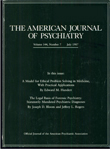Emergence of Adverse Events Following Discontinuation of Treatment With Extended-Release Venlafaxine
Abstract
OBJECTIVE: The rate of adverse events following discontinuation of treatment with extended-release venlafaxine was compared with the rate associated with discontinuation of placebo administration. METHOD: The subjects were 20 outpatients with major depressive disorder who had participated in a multicenter, double-blind, placebo-controlled study of the efficacy of the new extended-release formulation of venlafaxine. RESULTS: During the 3 days after discontinuation of treatment with the study drug, seven (78%) of the nine venlafaxine-treated subjects and two (22%) of the nine placebo-treated patients reported the emergence of adverse events, a statistically significant difference. CONCLUSIONS: These results suggest that clinicians discontinuing venlafaxine treatment should consider tapering the medication dose gradually. (Am J Psychiatry 1997; 154:1760–1762)



